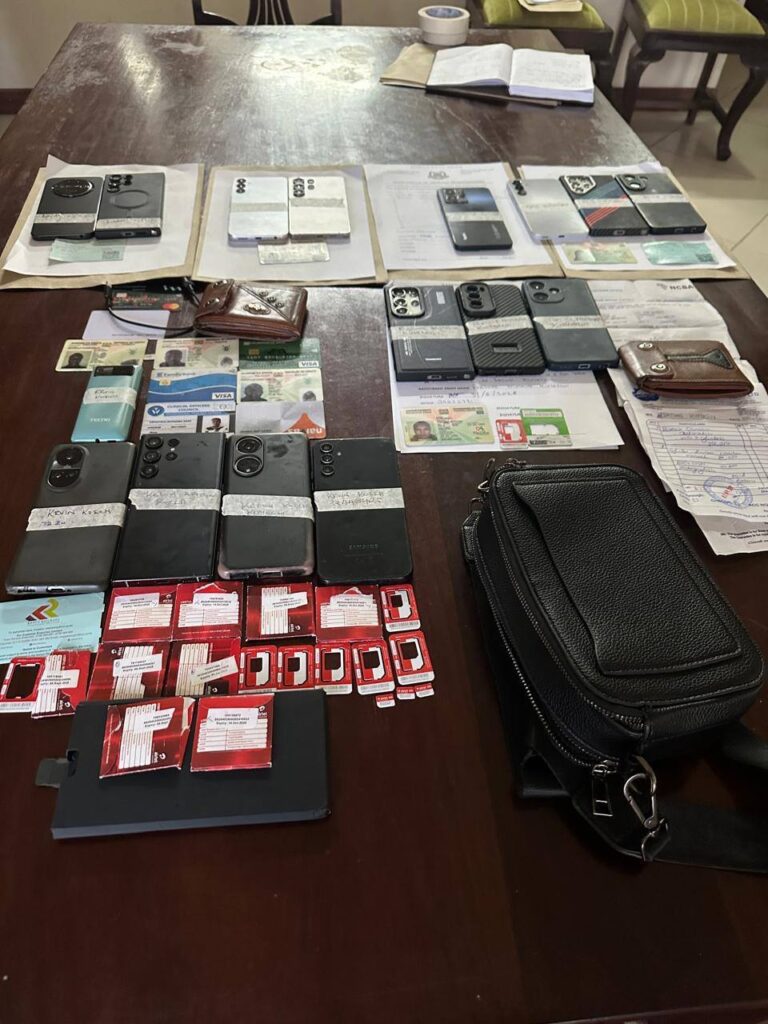
Written by Were Kelly
Mombasa/Nairobi, June 6, 2025 — A web of deception. Millions siphoned. Retirees left penniless. In a chilling saga of tech-savvy trickery, detectives have unearthed the inner workings of a ruthless cybercrime syndicate whose members are now behind bars following a dramatic arrest in Nyali, Mombasa County.
Six suspects, including the alleged masterminds Dominic Kipkoech Langat, alias Solobwek, and Fortune Muthina Kinyanzui, alias Albanas Kyalo, were arrested on May 31 in a sting operation by the Directorate of Criminal Investigations (DCI), following weeks of intelligence gathering.
According to investigators, the gang utilized caller ID spoofing technology—a sophisticated app capable of altering caller identities to resemble official bank and telecom hotlines.
The goal: to dupe unsuspecting victims into revealing personal banking credentials.
The suspects posed as customer care agents, skillfully inducing panic and urgency during phone calls.
Victims, believing they were speaking to trusted institutions, unknowingly handed over access to their life savings.
A critical breakthrough came when investigators traced fraudulent transactions linked to two mobile numbers—0750000040 and 073433335—frequently used by Langat. Records show these numbers moved millions of shillings daily since April 2025.
The emotional toll is just as staggering as the financial loss.
In Nyahururu, a man lost Sh 3.4 million, while a woman in a separate case woke up to find her account wiped clean of Sh 1.8 million.
On April 7, two separate victims in Nakuru reported losses of Sh 1.3 million and Sh 1.2 million, both following calls from fraudsters mimicking service centers.
Perhaps the most heartbreaking case is that of a 63-year-old retiree, a former Ministry of Lands employee, who lost Sh 2.3 million, just days after receiving her pension.
In similar fashion, other retirees and county workers in Nakuru were conned out of Sh 1.6 million and Sh 1.5 million, respectively.
Sources indicate that the gang targeted retirees—particularly women—immediately after pension disbursements, making them ideal marks in this calculated and cold-blooded financial slaughter.
Investigators say Fortune Kinyanzui was the technical brains behind the spoofing setup, charging each accomplice Sh 16,000 daily in airtime fees and taking a cut of Sh 30,000 to Sh 120,000, depending on the day’s “kill.”
Meanwhile, Langat, acting as the gang’s operational head, paid foot soldiers a 10–15% commission on their take.
The spoofing app, which reportedly cost over Sh 500,000, included a configured IP address and was heavily sought-after by other fraud networks, including the infamous “Mulot Swappers.”
On May 31, detectives stormed an Airbnb unit at APA Apartments, House B2, along 1st Avenue, Nyali, which had been turned into the gang’s training and operational hub.

Recovered from the scene were 19 mobile phones, multiple SIM cards and holders (from Safaricom, Airtel, Telkom, and even MTN Uganda), and a notebook containing a list of potential victims.
The suspects—Fortune Muthina, Ruel Kipkoech Yator (alias Papa Ruel), Laban Kipkirui Koech, Weldon Kipyegon Rono, Towet Kipkorir Alphonce, and Kelvin Kipyegon Koech—were arraigned at Kahawa Law Courts on June 3, where the court granted detectives more time to complete investigations. The case is set for mention on June 6, 2025.
The investigation is ongoing, with detectives working to trace more victims, additional suspects, and the final cash flow trail—including how funds were withdrawn and shared among the perpetrators.
Police are urging potential victims to report to their nearest station or directly contact DCI Headquarters for guidance on how to proceed.
“This syndicate represents the new face of organized crime: faceless, fast, and technologically armed. But the law is catching up,” a DCI official stated.


















